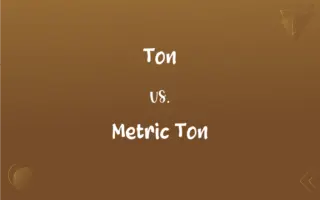Pretty vs. Gorgeous: What's the Difference?
Edited by Aimie Carlson || By Harlon Moss || Updated on October 7, 2023
Pretty refers to being pleasing in appearance, while gorgeous indicates a striking, stunning beauty.

Key Differences
Pretty is a word commonly used to describe something or someone that has a delicate and pleasant appearance. It's often utilized in casual contexts and can be a compliment that denotes mild, non-intense attractiveness. Gorgeous, on the other hand, carries a weightier connotation. It refers to something or someone possessing a kind of beauty that is both eye-catching and breathtaking.
Pretty might be used to describe features that are harmonious and pleasing, like a flower or a well-decorated room. It's subtle and might not always evoke a strong reaction. Gorgeous is not subtle. If something is described as gorgeous, it demands attention. It's the kind of beauty that can't be overlooked, like a stunning sunset or a glamorous movie star on the red carpet.
In terms of intensity, pretty is a bit subdued. When someone says, "That's a pretty dress," they're complimenting the dress, but in a gentle manner. But when someone says, "That's a gorgeous dress!" they're expressing a heightened level of admiration, almost as if they're in awe of the dress's beauty.
Another difference lies in the versatility of the word pretty. It can be used to describe not only physical appearance but also characteristics and situations. For example, "That's a pretty idea" or "She sings a pretty tune". Gorgeous, while occasionally used in similar diverse ways, primarily centers on visual splendor.
Lastly, pretty has a range of uses beyond just beauty. It can be used for emphasis, as in "pretty much" or "pretty sure". Gorgeous doesn’t have this same range and is mostly reserved for situations or things with pronounced beauty.
ADVERTISEMENT
Comparison Chart
Intensity
Mild, pleasant beauty.
Striking, stunning beauty.
Versatility
Can describe appearance, ideas, or situations.
Primarily used for strong visual appeal.
Connotation
Delicate, harmonious.
Breathtaking, demanding attention.
Usage Frequency
Common in casual contexts.
Used for heightened admiration.
Extensions
Can be used for emphasis ("pretty much").
More restricted in diverse usage.
ADVERTISEMENT
Pretty and Gorgeous Definitions
Pretty
Pleasing to the eye.
The flowers are pretty.
Gorgeous
Strikingly vivid or brilliant.
The fall foliage was absolutely gorgeous.
Pretty
Used for emphasis.
I'm pretty sure he'll come.
Gorgeous
Outstandingly wonderful.
The performance was simply gorgeous.
Pretty
Moderately high in degree.
It's pretty cold outside.
Gorgeous
Very beautiful or attractive.
The actress wore a gorgeous gown.
Pretty
Neat and orderly.
Her handwriting is pretty.
Gorgeous
Extremely stylish or appealing.
He has a gorgeous apartment.
Pretty
Slightly.
The car is pretty old.
Gorgeous
Eliciting admiration.
Her new haircut looks gorgeous.
Pretty
Pleasing or attractive in a graceful or delicate way.
Gorgeous
Dazzlingly beautiful or magnificent
Wore a gorgeous Victorian gown.
Pretty
Clever; adroit
A pretty maneuver.
Gorgeous
Characterized by magnificence or virtuosic brilliance
The pianist's gorgeous technique.
Pretty
Very bad; terrible
In a pretty predicament.
A situation that has reached a pretty pass.
FAQs
Can men be described as "pretty"?
Yes, while less common, men can be described as "pretty" to denote a delicate or refined attractiveness.
Is "pretty" always used to describe physical appearance?
No, "pretty" can also describe ideas, situations, or used for emphasis like "pretty much."
Can "gorgeous" describe non-physical things?
While primarily used for visual appeal, "gorgeous" can sometimes describe outstanding quality, like "gorgeous voice."
Is "gorgeous" used only for women?
No, "gorgeous" can be used to describe anyone, regardless of gender, or even things.
Is "gorgeous" always a compliment?
Generally, yes, but it can be sarcastic based on context.
Can "pretty" be used to describe sound?
Yes, e.g., "She sings a pretty tune."
Can "pretty" be used to describe situations?
Yes, for example, "That's a pretty mess."
Is "gorgeous" a stronger adjective than "pretty"?
Yes, "gorgeous" typically conveys a heightened level of beauty compared to "pretty."
How is "gorgeous" different from "beautiful"?
While both denote beauty, "gorgeous" often emphasizes a striking or radiant beauty.
Is "pretty" informal?
"Pretty" is versatile and can be used in both informal and formal contexts.
Are "pretty" and "gorgeous" synonyms?
They can be, but "gorgeous" usually denotes a higher degree of beauty.
Are there other meanings to "pretty"?
Yes, it can be used for slight emphasis or indicate degree, like "pretty cold."
Can "gorgeous" describe feelings?
Not typically, but in poetic or expressive contexts it might, e.g., "a gorgeous sense of joy."
Can "pretty" and "gorgeous" be used together?
Yes, for emphasis, e.g., "She looked pretty gorgeous at the event."
Which is more versatile: "pretty" or "gorgeous"?
"Pretty" is more versatile and can be applied in varied contexts.
How often is "pretty" used in daily language?
"Pretty" is a common adjective and is used frequently.
Is "gorgeous" used for non-living things?
Yes, objects, places, and even moments can be described as "gorgeous."
Is "gorgeous" more formal than "pretty"?
Not necessarily, but "gorgeous" is often used to express deeper admiration.
Can "gorgeous" be used sarcastically?
Yes, like many adjectives, context matters. "Gorgeous mess" could be sarcastic.
Can landscapes be described as "pretty" or "gorgeous"?
Yes, both words can describe natural beauty.
About Author
Written by
Harlon MossHarlon is a seasoned quality moderator and accomplished content writer for Difference Wiki. An alumnus of the prestigious University of California, he earned his degree in Computer Science. Leveraging his academic background, Harlon brings a meticulous and informed perspective to his work, ensuring content accuracy and excellence.
Edited by
Aimie CarlsonAimie Carlson, holding a master's degree in English literature, is a fervent English language enthusiast. She lends her writing talents to Difference Wiki, a prominent website that specializes in comparisons, offering readers insightful analyses that both captivate and inform.






































































